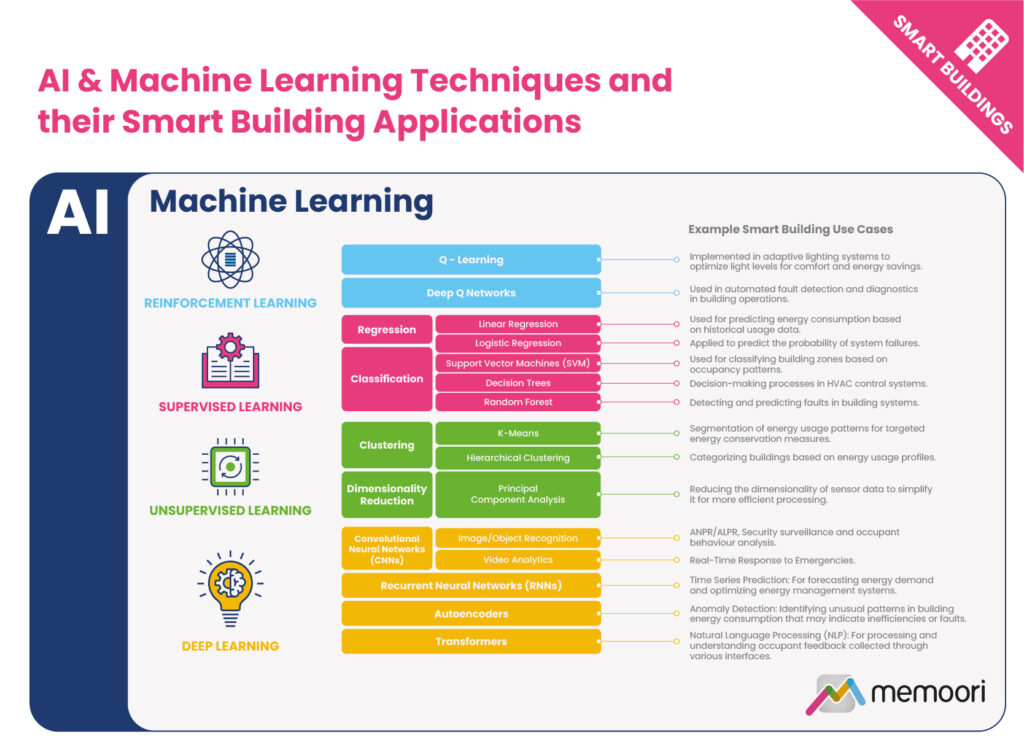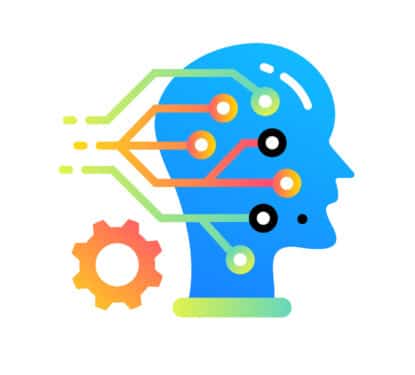"artificial intelligence"

The Expanding Role of Artificial Intelligence in Smart Building Applications
The application of artificial intelligence (AI) in smart buildings represents an immense opportunity to transform buildings from automated environments into intelligent spaces that continuously optimize themselves.
However, mainstream adoption still faces hurdles around trust, complexity, and integrating artificial intelligence with legacy infrastructure. Our latest study explores the current and future artificial intelligence applications in smart buildings to understand how the technology is shaping the future of real estate.
“The commercial buildings industry stands on the cusp of significant advancements, driven by AI’s potential to enhance operational efficiencies, improve occupant experiences, and contribute to sustainability goals,” states our new artificial intelligence in commercial buildings research. “As AI technologies become more accessible, commercial real estate stakeholders must navigate these developments strategically to harness AI’s full potential.”
Current Artificial Intelligence Applications for Smart Buildings
Energy management and efficiency are the foundational objectives of the smart building concept, it is therefore not surprising that energy optimization has also been a key focus for the emergence of artificial intelligence in smart buildings.
From HVAC optimization to dynamic lighting within the facility, to demand response, distributed energy, and EV charging on the grid edge, AI is quickly establishing itself as an essential energy optimization tool.
Energy optimization is typically a balance between energy consumption and the occupant experience, which has become another key focus for AI technology. By utilizing AI to tailor building conditions to individual preferences and needs, buildings can improve satisfaction, productivity, and staff retention.
Artificial intelligence can achieve this by analyzing data on behavior, sentiment, and environmental interactions, leading to a nuanced understanding of how occupants use spaces.
Another of the leading artificial intelligence applications for smart buildings is cybersecurity, which has accelerated out of necessity to defend buildings against cyber-attackers with artificial intelligence capabilities. Using network monitoring, incident response, and device management tools AI helps provide a proactive defense mechanism by enhancing threat detection and response capabilities to protect against operational disruptions and ensure occupant safety.
“Many of the best examples of effective artificial intelligence solution implementations cut across multiple use cases, providing potential benefits in terms of efficiency, security, comfort, and business performance. Many models being deployed are capable of leveraging occupancy data to both help maintain operational efficiency and, using the same data, to maintain comfort and productivity and respond intuitively to building user’s needs,” explains our new artificial intelligence research.

Future Artificial Intelligence Applications
Technology solution providers are beginning to harness the predictive power of Artificial intelligence for maintenance and asset optimization. AI supercharges fault detection and maintenance scheduling, as well as ensuring service optimization to avoid over-maintained systems. Specific building systems are also seeing benefits from the introduction of AI, such as sensor-based elevator and escalator optimization, or building envelope inspection using drone technology.
Amid growing environmental and regulatory pressures, AI is finding its role in driving better sustainability initiatives and ensuring compliance with evolving regulations through improved data collection and analysis.
Using AI, buildings can automate information gathering from across the facility and automate the generation of reports in line with global environmental standards. This AI analysis can also identify inefficiencies to help optimize energy, water, and waste management, contributing to the organization’s broader sustainability goals.
Digital twins can simulate various scenarios to help inform decisions about design, maintenance, and operations. The potential for artificial intelligence to enhance operational performance modeling, lifecycle cost analysis, retrofit simulations and other digital twin applications is clear.
“In recent years, interest in digital twins and simulation tools has increased significantly, with providers touting solutions that allow owners and operators to service a huge variety of use cases. Through the integration of artificial intelligence, digital twins can become better positioned to continuously fine-tune their capabilities based on streams of real-time data, while also uncovering hidden insights from historical datasets. Allowing digital twins to move beyond just passive representations of buildings, into active tools that provide prescriptive guidance to building owners and operators.

Should Human Intelligence Be The Blueprint For Artificial Intelligence?
…assess a specific animal’s intelligence we must separate it from human intelligence. Our natural urge is to anthropomorphize animals in order to judge their intelligence; an animal that learns to…

Charting the Rise of Artificial Intelligence in Commercial Buildings
…integration.” Adoption Trends for Artificial Intelligence in Commercial Buildings The integration of Artificial Intelligence into commercial buildings represents more than just an evolution from traditional BMS towards more sophisticated, data-driven…

The Artificial Intelligence Market in Commercial Buildings
…Artificial Intelligence Market in Commercial Buildings Where are we on the journey towards “truly cognitive buildings”? Today’s commercial building technology is transitioning away from rules-based analytics towards Artificial Intelligence predictive…

Live Event: Artificial Intelligence in Commercial Buildings
…findings from our forthcoming research into the market for artificial intelligence & machine learning in commercial building technologies. We will present some key findings from our research and try to…

Cutting Through the Hype Surrounding Artificial Intelligence in Smart Buildings
…Artificial General Intelligence (AGI), and then Artificial Super Intelligence (ASI). There is still a lot of benefit to be gained from ANI and, as is the nature of AI, even…

Facing the Urgent Challenge of Regulating Artificial Intelligence
Recently, Stanford Researchers Michal Kosinski and Yilun Wang trained a machine powered by artificial intelligence (AI) to detect sexual orientation of people to an accuracy of 81%, simply by scanning…

We Need To Talk About Artificial Intelligence
…human in a wide variety of ways. Almost 20 years on and it is no longer a novelty. Advancements in cyber-physical systems and artificial intelligence (AI) are reshaping our society,…
